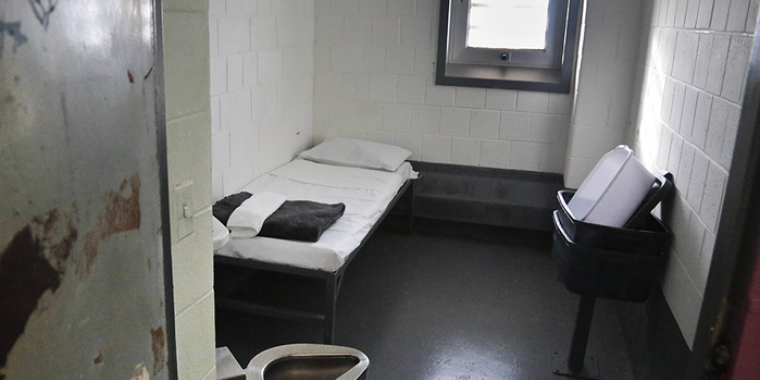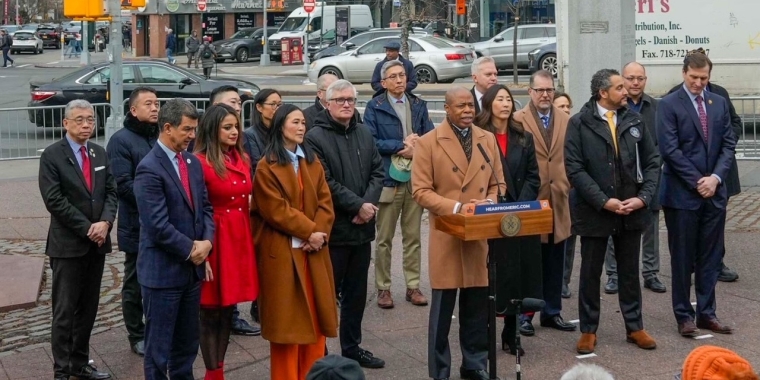
Forwarding: Senate Majority Passes the ‘HALT’ Solitary Confinement Act
March 18, 2021
-
ISSUE:
- Solitary Confinement
- Ending Mass Incarceration
- justice system
- Reform
- Alternatives to Incarceration

_______________
Senate Majority Passes the ‘HALT’ Solitary Confinement Act
(Albany, NY) Today, the Senate Democratic Majority passed the Humane Alternatives to Long-Term Solitary Confinement Act (HALT). Sponsored by Senator Julia Salazar, this legislation (S.2836) limits the use of segregated confinement for all incarcerated persons to 15 days, implements alternative rehabilitative measures, including the creation of Residential Rehabilitation Units (RRU), expands the definition of segregated confinement, and eliminates the use of segregated confinement for vulnerable incarcerated populations. Additionally, this bill establishes guidelines for humane conditions in segregated confinement, outlines reporting requirements, and adds due process protections by prohibiting placement in segregated confinement prior to a disciplinary hearing and by allowing access to counsel. The Nelson Mandela Rules, adopted by the United Nations, define segregated confinement for more than 15 days as torture. HALT will bring New York in compliance with this international standard and save the State tens of millions of dollars over the next several years.
“We remember the names Layleen Polanco, Kalief Browder, and Benjamin van Zandt, and the countless others whose lives have either been taken or destroyed by solitary confinement,” Majority Leader Andrea Stewart-Cousins said. “Prolonged segregated confinement can cause permanent harms and does not properly address the root causes that lead to the punishment. These reforms are morally right, fiscally responsible, and will improve outcomes at jails and prisons. This legislation is another major step in the Senate Democratic Majority’s commitment to reforming New York’s justice system. I applaud the sponsor, Senator Salazar, and all of the advocates who have helped make today happen.”
Senator Julia Salazar, Chair of the Senate Committee on Crime Victims, Crime and Correction, said, “It is no secret that the use of solitary confinement is inhumane, unethical, and constitutes torture under international law if it extends more than fifteen days. It must be discontinued immediately. The passage of HALT in the Senate brings us one step closer to bringing justice to all those who have lost loved ones to the wrongful use of solitary, and the New Yorkers who have been victims of this state-sanctioned torture. This monumental achievement wouldn't be possible without the efforts led by survivors of solitary and their family members, and I am thankful for their tireless advocacy. As the lead sponsor of this bill I am grateful for the support of the leadership in bringing this bill to the floor, as we seek to create more humane and effective alternatives to harmful incarceration across our state.”
The Humane Alternatives to Long-Term Solitary Confinement Act (HALT), S.2836, will:
- Limit the use of segregated confinement in state prisons and county jails and implement alternative rehabilitative measures, including the creation of Residential Rehabilitation Units (RRU).
- Restrict the use of segregated confinement for all incarcerated persons for up to 15 days.
- Expand the definition of segregated confinement to include any form of cell confinement where an individual is held for more than 17 hours a day.
- Mandate additional out-of-cell time and rehabilitative programming for individuals diverted to rehabilitative units after the 15-day limit has been reached.
- Prohibit segregated confinement for special populations for any period of time.
- Special populations are:
- Individuals age 21 or younger,
- Individuals age 55 and over,
- Individuals with a disability,
- And individuals who are pregnant, up to eight weeks postpartum, or caring for children in a facility.
- Special populations are:
- Prohibit the denial of services, treatment, or basic needs such as clothing, food, and bedding while an individual is held in segregated confinement.
- Mandate that staff must undergo 37 hours and 30 minutes initial training prior to assignment on segregated confinement units and 21 additional hours, annually, after assignment.
- Add due process protections by prohibiting placement in segregated confinement prior to a disciplinary hearing and by allowing access to counsel.
- Require DOCCS to publish monthly reports on its website with semi-annual and annual cumulative reports of the total number of people in segregated confinement.
Senate Deputy Leader Michael Gianaris said, “There should be no place in civilized society for the legalized torture of solitary confinement, which serves no useful purpose. I’m glad the Senate is joining with the Assembly to put this inhumane practice behind us once and for all.”
Senator Joseph P. Addabbo, Jr. said, “The Humane Alternatives to Long-Term Solitary Confinement Act Solitary Confinement Act (HALT) — which I co-sponsor in the Senate — will reform the way state prisons and county jails use solitary confinement,” said State Senator Joseph P. Addabbo, Jr. “Helping reform prisoners, rather than punishing them with solitary confinement, should be the goal of our prison system. I appreciate the work that went into crafting this bill that prevents vulnerable populations from being placed in solitary confinement, while still providing ways to deal with serious offenders.”
Senator Jamaal Bailey said, “Long term solitary confinement has consistently proven to be inhumane and leave significant mental health issues on those who are placed in confinement. This practice has gone on for far too long and has been used on our youth, elders, and some of our most vulnerable populations. I would like to thank Majority Leader Andrea Stewart-Cousins and Crime Victims, Crime, and Corrections Committee Chair Julia Salazar for their leadership and ensuring the passage of this crucial legislation.”
Senator Brian Benjamin said, “I'm proud to co-sponsor the HALT Act. It is long overdue that we end the practice of solitary confinement in prisons -- we need to provide alternative rehabilitation measures in place of cruel isolation. I thank my colleagues in the Senate who have co-sponsored this legislation, and I hope to see it become law in New York.”
Senator Alessandra Biaggi said, “Solitary confinement is torture and inhumane. Isolating incarcerated New Yorkers has life-long consequences on their physical and emotional wellbeing –– disproportionately impacting Black incarcerated people who represent 60% of New Yorkers held in solitary confinement units. The HALT Solitary Confinement Act will end the cycle of trauma we subject incarcerated people to, and heal our communities through therapeutic and rehabilitative solutions. I extend my gratitude to the solitary survivors, their loved ones, and formerly incarcerated New Yorkers who have advocated for this legislation for years. Passing the HALT Solitary Confinement Act is a vital step in the fight for restorative and racial justice.”
Senator Neil Breslin said, “The passage of the Humane Alternatives to Long-Term Solitary Confinement Act (HALT) could not have been done without the tireless efforts of advocates. This long overdue legislation is one of many steps I am proud to support to reform the criminal justice system in New York State.”
Senator Jabari Brisport said, “The use of prolonged solitary confinement has been widely denounced as a recognized form of torture. It is cruel and dehumanizing, and the fact that it has so long been an accepted tool of our incarceral system speaks miles about the fundamental nature of that system. HALT is a victory for human rights and a step towards a more just future.”
Senator Samra Brouk said, “As Chair of the Senate Mental Health Committee, I am deeply concerned about the ways that solitary confinement impacts a person’s mental health. The HALT Solitary Confinement Act will end the most harmful uses of isolation and solitary confinement currently in practice throughout our state. Under current solitary confinement laws, incarcerated people in New York State can be held in complete isolation for up to 23 hours a day. Solitary confinement has been shown to cause hallucinations, panic attacks, paranoia, and difficulties with thinking, concentration and memory. And when we force young adults, elders, or people with disabilities into solitary confinement, the impacts are exacerbated. The experience of being incarcerated is already one marked by violence, trauma, and injustice. I am proud that the Senate has passed the HALT Solitary Confinement Act, bringing New York State one step closer to ending the use of this cruel and unnecessary punishment.”
Senator Jeremy Cooney said, “Today, we move closer to ending a torturous and inhumane practice on incarcerated people in New York. Solitary confinement is ineffective and has no purpose in our restorative justice system. I stand with the #HALTSolitary campaign and I proudly voted to pass this landmark legislation by my colleague Senator Salazar.”
Senator Simcha Felder said, “We cannot stand by a practice in our justice system that has proven to be unjust. I am grateful to the families who opened my eyes to this problem and proud that we are ending it today.”
Senator Brad Hoylman said, “As with many other aspects of our flawed criminal justice system, solitary confinement is disproportionately used on incarcerated people of color: 80% of New Yorkers in solitary are BIPOC and 57% of them are Black. Being in solitary takes a devastating physical and mental toll on incarcerated New Yorkers and has been linked to psychosis, heart disease, self-mutilation, and death. We need to put an end to this injustice immediately. The Humane Alternatives to Long-Term Solitary Confinement Act restricts use of segregated confinement for up to 15 days, prohibits segregated confinement for youth, seniors, pregnant individuals and those with disabilities and requires collection of data on use of segregated confinement. I’m grateful for Senate Majority Leader Andrea Stewart Cousins’ leadership on criminal justice reform, Senator Julia Salazar’s leadership in getting this bill across the finish line and New York Campaign for Alternatives to Isolated Confinement for their efforts organizing the #HALTsolitary Campaign. I urge the Governor to sign this bill as soon as possible.”
Senator Robert Jackson said, “I’ve loudly voiced my support for the HALT Solitary bill since I took office over two years ago. It is inhumane to continue to keep someone confined and segregated from meaningful human contact. In the 21st century, it should have no place in our society. Ending solitary confinement saves lives and it also saves money. It’s that simple. My deep gratitude to the large grassroots #HALTsolitary coalition that has powered this movement from even before I took office, persevering in their advocacy during the setbacks of this pandemic. I am proud to fulfill our moral obligation as legislators of conscience to pass this bill and HALT solitary confinement.”
Senator Brian Kavanagh said, “There is no justification for continuing the terribly inhumane practice of solitary confinement, which is widely reported to cause extreme suffering, anxiety, panic, rage, paranoia, hallucinations, and, in some cases, suicide. Statistics show that those placed in solitary confinement are disproportionately young men, and disproportionately Hispanic and African American. I strongly support the Humane Alternatives to Long-Term Solitary Confinement Act, sponsored by Senator Julia Salazar, which would limit the time an inmate can spend in segregated confinement and create more humane and effective alternatives. We are long overdue to end this practice that the United Nations has deemed a form of torture. We must pass the HALT Solitary Confinement Act now.”
Senator Liz Krueger said, “It’s time for New York State to end the cruel and excessive use of solitary confinement. Everyone in our prison system, especially the large number struggling with serious mental illness, should be treated humanely and offered effective rehabilitative support, not punitive measures that only increase violence and recidivism. The HALT Solitary Confinement Act is a practical, smart, and urgently needed reform, and I am proud to join my colleagues in voting for it today.”
Senator John Liu said, “Our nation’s Constitution clearly prohibits cruel and unusual punishment including torture, and the United Nations has long condemned solitary confinement to be torture. It’s therefore inconceivable that New York has engaged in this horrific practice to this day. Passage of HALT-Solitary will finally bring our state into alignment with the rest of the international community. Much thanks to the unwavering advocates and Assemblyman Jeff Aubry for leading this decades-long fight.”
Senator Rachel May said, “Solitary confinement amounts to torture. If we have learned anything over the last year, it's that lack of human interaction is disastrous and can cause long lasting effects on mental and physical health. I want to thank the advocates for their many years of fighting to end this practice in New York and I proudly vote in support.”
Senator Shelley B. Mayer said, “These reforms to solitary confinement are an important step toward a more humane and effective corrections system statewide. The testimony I’ve heard from those formerly incarcerated individuals who have gone through prolonged solitary confinement is harrowing, and we must do better. I am committed to continuing to work with advocates and stakeholders, including county corrections officers, to align prison practices with intended outcomes and invest in tested solutions.”
Senator Zellnor Myrie said,“This legislation will end the torture of our neighbors, friends and family members condemned to solitary confinement across New York State, and replace it with safer and more meaningful interventions. I'm proud to support this legislation as we work toward a more just, humane and sensible criminal legal system.”
Senator Kevin Parker said, “It was imperative for us to create more humane and effective alternatives to correct human behavior. The harsh and abusive nature intrinsic to solitary confinement returns individuals to society worse than when they left, which in turn creates a huge public safety concern as mentally challenged individuals return to our already marginalized communities. With mental health incidents on the rise today, we must rethink our criminal justice system and the tools we employ to correct and rehabilitate our fellow citizens. As always, I stand in solidarity to end solitary.”
Senator Roxanne J. Persaud said, “Solitary confinement does not lead to rehabilitation, nor does it promote sustainable livelihood when New Yorkers re-enter their communities. This legislation implements alternative rehabilitative measures intended to promote recovery and successful re-entry. It has been a long road, but we have finally acted to HALT solitary confinement in New York State.”
Senator Elijah Reichlin-Melnick said, “Extended solitary confinement is a form of cruel and unusual punishment, which the Constitution forbids. It does irreparable harm to the people who are forced to endure it, and it is well past time that we end this practice. No matter what crime people have been convicted of, torture should have no place in our criminal justice system.”
Senator Gustavo Rivera said “I am very proud that the Legislature is passing the Human Alternatives to Long Term (HALT) Solitary Confinement Act at last. We are finally putting an end to this inhumane, ineffective, and abusive practice that has been condemned nationally and internationally. As we take another important step in reforming our State's criminal justice system, we must continue focusing on implementing alternate approaches that are centered on rehabilitation rather than punishment.”
Senator James Sanders Jr. said, “Long-term solitary confinement amounts to cruel and unusual punishment and has been shown to cause physical, emotional and psychological damage. Moreover it fails to address and treat the underlying cause of an offender’s behavior. We need to rehabilitate inmates so that they can become productive members of society and are less likely to commit future crimes. There can be no benefit to locking someone away in a cell for 22 to 24 hours a day without any meaningful human contact or therapy. I am proud to join my colleagues in supporting the HALT Solitary Confinement Act, which will implement restrictions on who can be confined and for how long and will create more humane and effective alternatives to such confinement.”
Senator Luis Sepúlveda said, “The passage of #HALT has always been a top priority for me in the New York State Senate. As the previous sponsor, I have worked hard with advocates and colleagues in government on #HALTsolitary legislation to put an end to the inhumane practice of long-term solitary confinement here in New York State. Solitary confinement leads to higher morbidity rates, deep psychological torture, and lasting trauma for individuals even after incarceration; it also disproportionately affects Black and Latinx people in prison systems. The harmful effects on their mental and physical state are indisputable and horrifying. I am proud to see this legislation pass both Houses today, and I congratulate all the advocates who for years staunchly fought and dedicated themselves to making this come true. By implementing rehabilitative alternatives to incarcerated individuals, we are charting a more humane path forward.”
Senator José M. Serrano said, “It is past time for New York to end the archaic practice of prolonged solitary confinement, which can only be defined as torture. Solitary confinement is inhumane, and with people of color accounting for 8 of 10 New Yorkers in solitary, minority communities are disproportionately affected. I am proud that today we have taken a step to finally stop this cruel and ineffective practice that has lasting mental and physical impacts, and which has claimed so many lives in the state of New York.”
Senator Toby Ann Stavisky said, “The HALT Solitary Confinement Act helps ensure that our correctional facilities serve as a place of rehabilitation, not inhumane, excessive punishment. The bill limits solitary confinement to 15 days and enacts other reforms. I am proud to be a co-sponsor.”
Senator Kevin Thomas said, “Solitary confinement is an inhumane, torturous practice. We know that solitary confinement does not change behavior nor rehabilitate. I am proud to join my colleagues in supporting the HALT Solitary Confinement Act, which will pave the way for the more humane treatment of incarcerated individuals and improve the overall health and safety of our communities.”
Jerome Wright, Statewide Organizer for the #HALTsolitary Campaign and a survivor of more than seven years in solitary confinement, said: “For many years, survivors of solitary confinement and families who have lost loved ones in solitary have led a campaign to end this torture and replace it with safer and more effective interventions. Freedom from torture is the most basic of human rights, and yet every year tens of thousands of New Yorkers are subjected to it in the form of solitary confinement for weeks, months, years, and even decades. Today the New York Senate passed the HALT Solitary Confinement Act, bringing our state closer to the goal of protecting the human rights of incarcerated people. I applaud Majority Leader Andrea Stewart-Cousins and our lead Senate sponsor and champion Julia Salazar, as well as her staff. It is now up to the Governor to sign HALT into law and forever change the punishment paradigm, moving away from torture and toward treatment – a win for all New Yorkers.”
Jovada Senhouse, Board Member and Civil Rights Union leader at VOCAL-NY, said, “I spent 120 days in solitary confinement myself; it’s torture. For the past four years I have been advocating to pass the HALT Bill in Albany so no one else will have to go through what I did. I am so happy to see the Senate pass this bill and now Cuomo must sign it! But we aren’t stopping - we need Elder Parole, Fair & Timely Parole, to restore the right to vote for incarcerated and formerly incarcerated people and to provide a path for people to challenge wrongful convictions.”
Anisah Sabur, Statewide Organizer for the #HALTsolitary Campaign, said: “We are living in a moment in history that is both awesome and terrifying. With the racist and deadly state violence against people of color that we’ve seen in the streets, and that which we cannot see behind prison walls, people across our state and country are rising up. The time has come to bring humanity back to our communities. Today is a day of healing for those like me who have lived through solitary confinement. Our survival alone is an act of rebellion and that is why we’re fearless in our fight to enact HALT. Thank you to all of those who brought our voices into the Senate and Assembly chambers and made this victory possible. I also thank Majority Leader Stewart-Cousins and all Senate counsel and staff, including Shontell Smith, Jessica Persaud, Donavan Borington, and Nic Rangel. Now, the Governor must sign the bill immediately.”
Jose Saldana, Director of the Release Aging People in Prison Campaign, said, “Our elected leaders, representing the concerns and values of our communities, the Black & Latinx communities that elected them, have courageously voted to pass the HALT Solitary Confinement Act. We call on the Governor to sign this bill into law in support of the humanity and dignity of incarcerated human beings and their families. HALT must be the law of the land in New York State. Thousands of New Yorkers have paid for this bill to become the law, some with their lives, many others with their mental, emotional and spiritual health. Today is a good day for justice, and for all New Yorkers.”
Sochie Nnaemeka, New York Working Families Party State Director, said, “The passage of the HALT Solitary Confinement Act is thanks to years of tireless organizing by activists and New Yorkers who have been directly impacted by this cruel practice of solitary confinement. Thank you to our Senate and Assembly leadership who heeded the call of New Yorkers and championed this crucial and moral bill. New Yorkers marched in the streets and took to the ballot last year to demand we collectively reckon with the crises of structural anti-Black racism and wanton cruelty in our criminal legal system. Solitary confinement is one of the many ways our state disproportionately punishes Black and brown people — and causes immense suffering and devastating physical and mental harm.”
“Just a few years ago, this victory might not have been possible. But thanks to the millions of New Yorkers who voted to send a critical mass of bold, progressive representatives to the legislature, we were able to finally move on this long-overdue reform. The New York Working Families Party has been proud to stand with this coalition in the fight to pass the Halt Solitary Confinement Act, and we are proud to celebrate this critical step towards making our state a more just, humane and safe home for all New Yorkers.”
Marvin Mayfield, Lead Statewide Organizer at Center for Community Alternatives, said, “The torturous practice of solitary confinement in New York State will finally be changed with the passage of the HALT Solitary Confinement Act, and not a moment too soon. We can never account for all of the damage, the mental anguish and physical trauma caused by solitary confinement, but now we can turn the page on a dark chapter in our history and face the future with a renewed sense of justice and compassion. As a person who has survived solitary confinement, I am grateful for the dedication of all the advocates and elected officials who worked so hard to end the suffering of our incarcerated brothers and sisters. We celebrate the passage of HALT by the New York State Senate and call on the Governor to sign it immediately.”
Laura Pitter, Deputy Director of the US Program at Human Rights Watch, said, “For years New York has allowed jail and prison staff to keep people locked up in isolation for prolonged periods in ways that amount to torture. The Halt Solitary Confinement Act ends this practice. Our US criminal justice system, in New York and elsewhere, still needs a complete overhaul but passing this bill is a really important step in the right direction. It recognizes the truly harmful effects of prolonged solitary and the importance of emphasizing treatment and rehabilitation over abusive punishment and isolation.”
Harvey Rosenthal, CEO of the New York Association of Psychiatric Rehabilitation Services, said, “Mental health advocates from across the state come together to laud the Senate’s historic groundbreaking action today. HALT’s passage will put an end to the barbaric use of inhumane solitary confinement that has either created or exacerbated severe mental illnesses in our prisons and jails across the state, resulting in countless avoidable heartbreaking suicides. Replacing the cruelty of solitary confinement cells with rehabilitative units will go a very long way to transforming prisons from the policies of torture to ones rooted in rehabilitation, recovery and a stable return to home communities.”
Julia Solomons, Policy Advocate and Social Worker at The Bronx Defenders, said, “Today we celebrate the passage of this critical legislation. While there is much work left to do to achieve justice for Black and brown communities impacted by mass incarceration, HALT’s passage sends an important message that we value all New Yorkers, regardless of race, class, or criminal history, and we will not continue to stand idly by and allow them to be tortured in NYS prisons and jails.”
###



